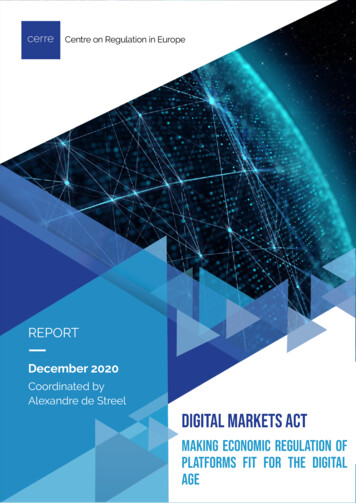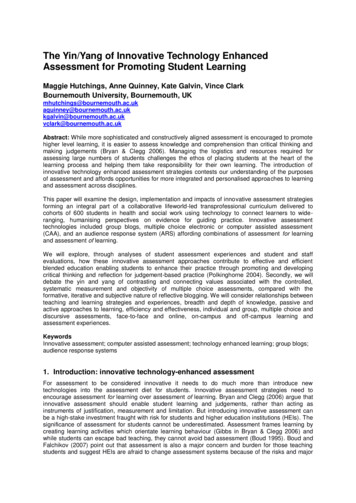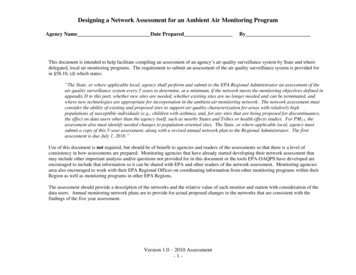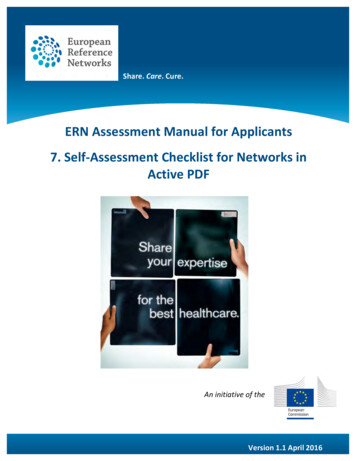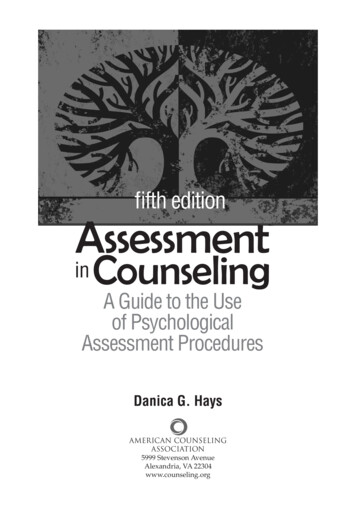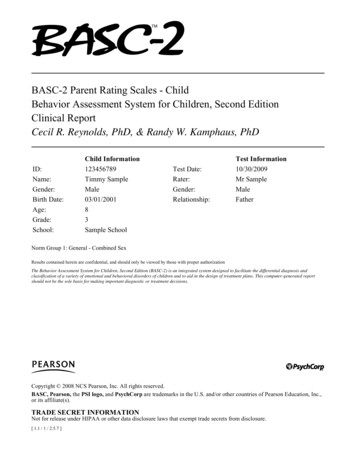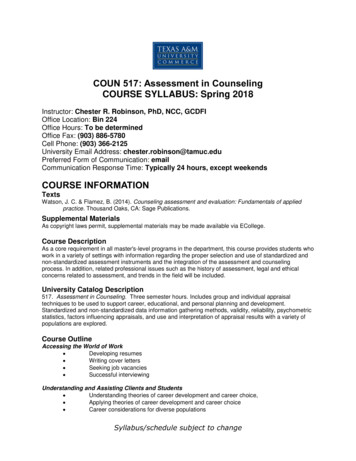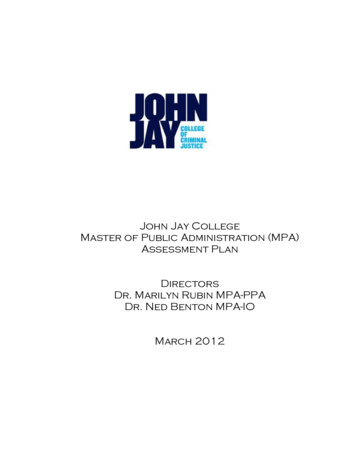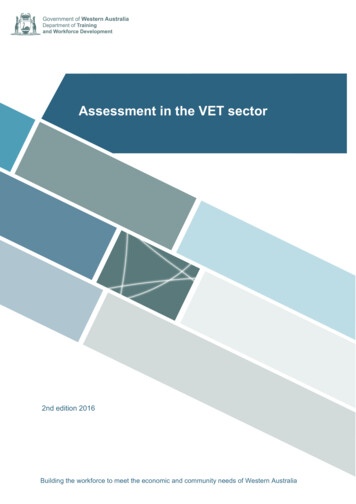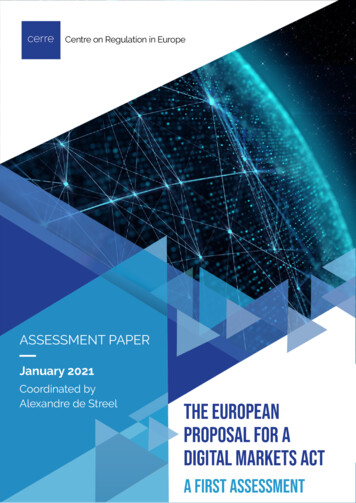
Transcription
ASSESSMENT PAPERJanuary 2021Coordinated byAlexandre de StreelJanuary 2021The European proposal for a Digital Markets Act: A first assessment1/27
The recommendations presented in this paper were prepared by a team of academics coordinatedby the CERRE Academic Co-Director Alexandre de Streel and composed of Bruno Liebhaberg,Amelia Fletcher, Richard Feasey, Jan Krämer and Giorgio Monti.As provided for in CERRE's by-laws and the procedural rules from its “Transparency &Independence Policy”, this report has been prepared in strict academic independence. At all timesduring the development process, the research’s authors, the Academic Co-Directors, and theDirector General remain the sole decision-makers concerning all content in the report. Copyright 2021, the Authors and Centre on Regulation in Europe (CERRE)info@cerre.euwww.cerre.euJanuary 2021The European proposal for a Digital Markets Act: A first assessment2/27
Table of contentsExecutive Summary . 61Introduction . 92Objectives and principles . 93Scope and criteria to designate regulated gatekeepers . 103.1Services susceptible to ex ante regulation: Core Platform Services . 113.2Criteria to designate Gatekeeper of core platform services . 124Obligations imposed on core services platforms gatekeepers . 165Institutions and enforcement . 235.1Institutional design . 235.2Oversight and enforcement modes . 25January 2021The European proposal for a Digital Markets Act: A first assessment3/27
Alexandre de Streel is Academic Co-Director at CERRE and aprofessor of European law at the University of Namur and theResearch Centre for Information, Law and Society (CRIDS/NADI). Heis a Hauser Global Fellow at New York University (NYU) Law Schooland visiting professor at the European University Institute,SciencesPo Paris and Barcelona Graduate School of Economics, andalso assessor at the Belgian Competition Authority. His main areasof research are regulation and competition policy in the digitaleconomy as well as the legal issues raised by the developments ofartificial intelligence. Recently, he advised the European Commissionand the European Parliament on the regulation of online platforms.Previously, Alexandre worked for the Belgian Deputy Prime Minister,the Belgian Permanent Representation to the European Union andthe European Commission (DG CONNECT). He holds a Ph.D. in Lawfrom the European University Institute and a Master’s Degree inEconomics from the University of Louvain.Bruno Liebhaberg is Director General of the think tank Centre onRegulation in Europe (CERRE). He is also currently the chair of theEU Observatory on Online Platform Economy. He was a professor atthe Université Libre de Bruxelles’ Solvay Brussels School ofEconomics and Management (SBS-EM ULB) from 1979 to 2018.Earlier in his career, he advised former European CommissionPresident Jacques Delors on industry and R&D matters. He holds aMaster in Management Sciences from SBS-EM ULB and a PhD fromthe London School of Economics and Political Science.Amelia Fletcher CBE is a Professor of Competition Policy at theCentre for Competition Policy, University of East Anglia. She is alsoa Non-Executive Director at the UK Competition and MarketsAuthority and a member of the Enforcement Decision Panel atOfgem. From 2013/4 to 2020, she was a Non-Executive Director atthe Financial Conduct Authority and the Payment Systems Regulator,and has been a member of DG Comp’s Economic Advisory Group onCompetition Policy. She was a member of the Digital CompetitionExpert Panel, commissioned by the UK Treasury and led by JasonFurman, which reported in March 2019. She was previously ChiefEconomist at the Office of Fair Trading (2001-2013), where she alsospent time leading the OFT’s Mergers and Competition Policy teams.Before joining the OFT, she was an economic consultant at FrontierEconomics (1999-2001) and London Economics (1993-1999). Shehas written and presented widely on competition and consumerpolicy. In her ongoing research, Amelia has a particular interest inthe implications for competition and consumer policy of behaviouraleconomics and online markets. Amelia has a DPhil and MPhil ineconomics from Nuffield College, Oxford.January 2021The European proposal for a Digital Markets Act: A first assessment4/27
Richard Feasey is a CERRE Research Fellow, an independentconsultant and a Senior Adviser to the Payment Systems Regulatorin the UK. He lectures at University College London and Kings CollegeLondon. Richard was previously the Public Policy Director of VodafoneGroup plc from 2001 until 2013. In October 2017, he was appointedto the panel of the UK’s Competition and Markets Authority and inOctober 2018 to the National Infrastructure Commission for Wales.Jan Krämer is an Academic Co-Director at CERRE and a Professorat the University of Passau, Germany, where he holds the chair ofInternet & Telecommunications Business. Previously, he headed aresearch group on telecommunications markets at the KarlsruheInstitute of Technology (KIT), where he also obtained a diplomadegree in Business and Economics Engineering with a focus oncomputer science, telematics and operations research, and a Ph.D.in Economics, both with distinction. He is editor and author of severalinterdisciplinary books on the regulation of telecommunicationsmarkets and has published numerous articles in the premierscholarly journals in Information Systems, Economics, Managementand Marketing research on issues such as net neutrality, data andplatform economy, and the design of electronic markets. ProfessorKrämer has served as academic consultant for leading firms in thetelecommunications and Internet industry, as well as forgovernmental institutions, such as the German Federal Ministry forEconomic Affairs and the European Commission. His current researchfocuses on the role of data for competition and innovation in onlinemarkets and the regulation of online platforms.Giorgio Monti is Professor of Competition Law at Tilburg Law School.He began his career in the UK (Leicester 1993-2001 and LondonSchool of Economics (2001-2010) before taking up the Chair incompetition law at the European University Institute in Florence,Italy (2010-2019). While at the EUI he helped establish the FlorenceCompetition Program which carries out research and training forjudges and executives. He also served as Head of the LawDepartment at the EUI. His principal field of research is competitionlaw, a subject he enjoys tackling from an economic and a policyperspective. Together with Damian Chalmers and Gareth Davies heis a co-author of European Union Law: Text and Materials (4th ed,Cambridge University Press, 2019), one of the major texts on thesubject. He is one of the editors of the Common Market Law Review.January 2021The European proposal for a Digital Markets Act: A first assessment5/27
Executive SummaryThe Digital Markets Act (DMA) and the Digital Services Act (DSA), which have beenproposed by the European Commission in December 2020, will be a paradigm shift in theregulation of online platforms in Europe. With its mission of improving digital industriesregulation, CERRE wants to contribute to the key policy debate that has been triggered by those twoproposals. Prior to the adoption of the Commission proposals, a group of CERRE Academics maderecommendations for a robust DMA and DSA which would stimulate contestability, innovation andfairness in the digital economy as well as ensure safer and trusted Internet where fundamental rightsare respected. Now that the Commission proposals have been adopted and are under negotiation inthe European Parliament and the Council of Ministers, CERRE will run a series of debates andreflection on those proposals. We kick off this series with a first assessment of the DMA proposal.Our main suggestions for improvements are the following:1. Regarding the objectives of the new proposed rules,-We think market contestability is consistent with the main concerns raised in severalrecent reports on the functioning of digital markets, and in keeping with Europeanordoliberal tradition. The DMA should contribute to a good functioning of the markets inthe long run, thereby promoting the diversity and the rate of innovation.-Contestability is a form an ex ante fairness. The new rules also aim to ensure more ex postfairness. This second objective may be justified, provided it is very cautiously craftedand does not lead to legal uncertainty or regulatory creep.2. Regarding the designation of the regulated gatekeeper,-We think that three criteria test (i.e., significant impact on the internal market, importantgateway to reach end-users and entrenched position) is sound for the purpose ofidentifying digital platforms with gatekeeper power, although an additional fourthcriterion linked to the provision of several digital services could have been preferable.Implicitly, this would have introduced an ecosystem criterion.-The reliance on financial and user size thresholds as a rebuttable presumption for meetingthe three criteria test speeds up the designation process and incentivises digital platformsto disclose quantitative and qualitative indicators, on which they hold more information thanthe Commission. However, it should be clear that size is not directly linked togatekeeper power.-The list of quantitative and qualitative indicators to rebut the presumption reflects theeconomic theory on gatekeepers. However, as the gatekeeper concept is new in EU law, werecommend that the Commission adopts a delegated act or guidelines for the way itwill use and assess those gatekeeper indicators in order to enhance legal predictabilityon such key issues in the DMA.3. With regard to the obligations and prohibitions to which the regulated gatekeepers are subject,-We recommend more flexibility in the rules. The black list should be very limited and onlycontain obligations which are detailed and which are always detrimental to marketcontestability and B2B fairness. The grey list should contain obligations which are moregenerally drafted on the basis of the following theories of harm: lack of transparency,envelopment through bundling and self-preferencing, lack access to platforms and data, lackof users mobility and lack of fairness.January 2021The European proposal for a Digital Markets Act: A first assessment6/27
-We also recommend that the possibilities for individualisation of the obligation on thebasis of the characteristics of the regulated gatekeeper should be more explicit, and that themeasures to be taken by the gatekeepers to comply with the DMA obligationsshould be co-determined by the Commission and the gatekeepers themselves.-Moreover, the Commission should also have the possibility of not imposing a specificobligation to a specific regulated gatekeeper at all, if this is justified on the basis that thereis no measure which would be both effective and proportionate.-We also recommend to introduce explictly the possibility for the gatekeeper to bring adefence in order to escape the application of some obligations by demonstrating that itspractices do not harm market contestability and B2B unfairness.Regarding the institutional design,-We agree that it is appropriate to have centralised enforcement at the EU level and findit pragmatic to confer enforcement power to the Commission. However, this has importantconsequences for the features and the working methods of the Commission. If theCommission wants to share the same characteristics that EU law imposes upon regulatoryauthorities at the Member State level, it should have sufficient budgetary and humanresources, be independent from the regulated platforms but also from politicalpower and be accountable.-Moreover, the Commission should maximise the synergies between its differentpowers, in particular the antitrust power and new powers acquired under the DSAagainst Very Large Online Platforms; at the same time, the Commission should also be clearand predictable about how those powers will be applied and combined.-Given those synergies, we recommend that a joint task force composed of DGsCONNECT, COMP and GROW is in charge of enforcing the DMA.-We also recommend a bigger role for national independent authorities to support theCommission in enforcing the DMA. In particular, national authorities may receive complaintsfrom business users, contribute to the specification of the obligations of the grey list, monitorthe compliance with obligations and contribute to the design of remedies in case of noncompliance.Regarding oversight and enforcement modes,-We think that those modes need to be cooperative rather than adversarial. Thus, werecommend better aligning the DMA modes of oversight and enforcement to whathas been proposed in the DSA, instead of modelling them on antitrust enforcement. Inparticular, the DMA should require more internal compliance mechanisms such as regularrisk assessments, independent audits or the appointment of compliance officers and shouldrely more on commitments and codes of conduct.-Next to the regulated gatekeepers, the Commission should also be supported in its difficultenforcement tasks by the business users of the gatekeepers as well as the other digitalplatforms providing substitute or complementary services. Thus we recommend that theDMA give a more explicitl role for those stakeholders, in particular in the design of themeasures to implement the obligations, and indeed the remedies in case of non compliance.-We welcome the extensive investigation powers given to the Commission on database andalgorithms. To be effectively used, we recommend that Commission is staffed with moredata and AI experts and can partner with vetted independent experts.January 2021The European proposal for a Digital Markets Act: A first assessment7/27
-Finally, it seems to us that the proposed DMA is not sufficiently responsive to technologyand market evolution. Therefore, we recommend introducing a requirement for theCommission to regularly review the impact of obligations imposed and measures takenby the gatekeepers to consider whether they are working as intended or, conversely, toallow firms to make representations that they should be modified.In a nutshell, we think that the DMA proposal goes in the right direction, moving towards makingdigital markets more contestable and stimulating innovation and fairness in the digital economy.However, we recommend that the European Parliament and the Council improve the proposal inorder, on the one hand, to make the rules more flexible and even more responsive to theinevitable technology and market evolution and, on the other hand, to make oversight andenforcement more cooperative as has been proposed in the DSA.January 2021The European proposal for a Digital Markets Act: A first assessment8/27
1 IntroductionOn 15 December 2020, the European Commission adopted the much-awaited proposal for the DigitalMarkets Act (DMA) the goal of which is to increase the contestability and the fairness of the digitaleconomy in the European Union.1 The same day, the Commission also adopted the Digital ServicesAct (DSA) with the aim of ensuring that Europe is a safe, predictable and trusted online environmentwhere fundamental rights are protected.2 Those two proposed instruments are now being negotiatedby the European Parliament and the Council of Ministers and could be finalised by 2022 with anapplication in 2023. Together, the two proposals amount to a paradigm shift in the EU regulation ofdigital platforms and their implementation will define the responsibilities for the largest platformcompanies of the world when operating in Europe.In order to contribute to this important policy debate, CERRE adopteda series of policyrecommendations for the DMA and the DSA ahead of the Commission proposals. Now that theproposals have been published, this paper aims to give a first assessment of the tabled DMA and tosuggest possible improvements for the ongoing legislative negotiations.3 This paper is structured asfollows: after this introduction, section 2 deals with the objectives and principles of the new rules.Then, section 3 deals with the digital services targeted by DMA and the criteria to designate thedigital platforms that will be regulated. Then, section 4 deals with the obligations to which theregulated platforms will be subject. Finally, section 5 deals with the institutional design and theenforcement methods. Each section briefly summarises the DMA proposal and then makes a firstassessment with suggestions for improvements (which are underlined in grey to facilitate thereading).2 Objectives and principlesThe proposed Digital Markets Act aims to achieve three objectives: 4-To ensure contestability of digital markets, which means that markets should remainopen to new entrants and innovators offering digital services that may substitute orcomplement the services already offered by the existing platforms;5-To ensure fairness of the B2B relationship between the digital gatekeepers and theirbusiness users, which is defined as a balance between the rights and obligations of eachparty and the absence of a disproportionate advantage in favour of the digital gatekeepers;6-To strengthen the internal market by providing harmonised rules across the EU.7Thus, the contestability objective, as a sort of ex ante fairness, is related to the long-term efficiencyof the markets (i.e. the future size of the pie) and is probably easier to implement and operationalisethan factors like ‘impact on innovation, quality or privacy’. The fairness objective, which is more akinto ex post fairness, is more related to the distribution of the value created by digital markets (thedistribution of the pie).1Proposal of the Commission of 15 December 2020 for a Regulation of the European Parliament and of the Council on contestableand fair markets in the digital sector (Digital Markets Act), COM(2020) 842. The Impact Assessment of the Commission servicesprovide very useful background information to better understand the rationale of the proposal: Impact Assessment Report of theCommission Services on the Proposal for a Regulation of the European Parliament and of the Council on a Single Market ForDigital Services (Digital Services Act), SWD(2020) 363.2Proposal of the Commission of 15 December 2020 for a Regulation of the European Parliament and of the Council on a SingleMarket For Digital Services (Digital Services Act) and amending Directive 2000/31, COM(2020) 825.3See de Streel et al. (2020), Digital Markets Acts: Making Economic Regulation of Platforms Fit for the Digital Age, CERRE Report.4Prop DMA, art.1.1. Those objectives are different from those proposed in the UK for the DMU which are to further the interestsof consumers and citizens in digital markets, by promoting competition and innovation, but should nevertheless be broadlyconsistent with those objectives.5This is sometimes referred as fairness in some Executive Vice President Vestager speeches.6Prop DMA, art.10.2 and also art.7(6) and recital 57.7Those objectives are very similar to those recommended in the CERRE Recommendations, p. 98-99. However, CERRE alosproposed empowering users as a fourth objective.January 2021The European proposal for a Digital Markets Act: A first assessment9/27
Those three specific objectives aim to achieve a more general goal, which is to ensure that thelevel of innovation, the quality of digital products and services, the degree to which prices are fairand competitive, and the degree to which quality or choice for business users and for end-users isor remains high.8Obviously, other EU laws, such as the competition law, the Platform-to-Business Regulation, theGDPR, the Audiovisual Media Services Directive or the European Electronic Communications Codes,are already contributing to those objectives, but some regulatory gaps remain that the proposedDMA aims to close.9 In covering those gaps, the DMA will be a complement – and not a substitute to those other EU rules.10Thus, the proposed DMA covers the gaps of competition law and intervenes whencompetition law cannot act and can only act in an ineffective manner in achieving marketcontestability and B2B contractual fairness.11 Hence, the DMA will apply adjacent to competitionlaw. It is important to note that in case of parallel applications of both the DMA and competition law,the Court of Justice of the EU has already judged that there is only a very limited regulated conductdefence when compliance with regulation forces the regulated firms to violate competition law.12 EUInstitutions have also adopted a very narrow understanding of the ne bis in idem principle whichallows the same corporate conduct to be condemned under two different regulatory instruments,such as the DMA and competition law, if they protect different legal interests13.The proposed DMA also complements the GDPR by strengthening or extending some of itsobligations, in particular the requirement of user consent in case of data lakes, the obligationsrelated to data portability and transparency on consumer profiling algorithms.14As the proposed DMA aims to harmonise the obligations applicable to digital gatekeepers, itprohibits the Member States from imposing further obligations on gatekeepers for thepurpose of ensuring contestable and fair markets.15 However, Member States remain free toimpose obligations which (i) pursue other legitimate interests such as consumer protection or unfaircompetition, or (ii) which are based on EU competition rules and national competition rules, providedthis is allowed under EU law.16In pursuing its objectives, the proposed DMA applies two key general principles of EU law: 17-first the principle of effectiveness,-second, the principle of proportionality which implies that the content and form ofregulatory obligations should not exceed what is necessary to achieve the objectives of theDMA.188Prop DMA, rec.25 and 79.Prop DMA, rec.5, 10-1110Europe has a long tradition of combining antitrust and regulation to pursue similar policy objectives with each of the twoinstruments focusing on their respective strengths: ct-explainer-europeanregulation-big-tech/.11Prop DMA, Rec.9 and 10 and IA, paras 119-124.12Case C-280/08P Deutsche Telekom, ECLI:EU:C:2010:603.13COMP/39.525, Telekomunikacja Polska, paras 143-145. This is confirmed by Prop. DMA, rec.10.14Resp. art.5a, art. 6.1h and I and art.13.15Prop DMA, art.1.6.16Council Regulation 1/2003 of 16 December 2002 on the implementation of the rules on competition laid down in Articles 81and 82 of the Treaty, O.J. [2003] L 1/1, as amended, art.3(2) provides that: “( ) Member States shall not under this Regulationbe precluded from adopting and applying on their territory stricter national laws which prohibit or sanction unilateral condu ctengaged in by undertakings”. Therefore, it seems that that Section 19a of German Competition Law on Abusive Conduct ofUndertakings of Paramount Significance for Competition across Markets which is about to be adopted with the 10 th Amendmentof the Competition law can be applicable next to the DMA as it is based on national competition law.17See in particular, art.7.2 for obligations specifications as well as art.15.1 and 15.2 for additional behavioural and structuralremedies in case of systematic non-compliance.18TEU, art.5(4).9January 2021The European proposal for a Digital Markets Act: A first assessment10/27
AssessmentThe objective of market contestability is consistent with the main concerns which have beenraised by many recent reports on the functioning of digital markets, as well as with theordo-liberal tradition of Europe. It should ensure good functioning of the markets in the long runand favours long-term competition over short-term efficiencies, thereby promoting the diversity andprobably the rate of innovation.The objective of B2B fairness is consistent with the national traditions of many Member States, butis relatively new at the European level. Indeed EU law in general has tended, so far, to stay awayfrom distributional issues, with competition law in particular tending to prioritise exclusionary abusesover exploitative abuses. This may be justified as the heterogeneity of preferences among MemberStates is higher for distributional issues than for (short or long term) efficiency issues. However, asbargaining power may be very unbalanced between digital gatekeepers and their users, a fairnessobjective may be justified, provided it is very cautiously crafted and does not lead to legaluncertainty or regulatory creep.The two main regulatory principles, effectiveness and proportionality, are consistent withgeneral EU law, as well as with any smart regulatory system.3 Scope and criteria to designate regulated gatekeepers3.1Services susceptible to ex ante regulation: Core Platform ServicesThe scope of the proposed DMA covers the following closed list of digital services, which aredesignated as “Core Platforms Services” (CPS):19-Online B2C intermediation services20 which include marketplaces21 such as AmazonMarketplace and app stores22 such as Apple App Store or Google Play store;-Online search engines23 such as Google search or Microsoft Bing;-Online social networks24 such as Facebook;-Video-sharing platform services25 such as Youtube;19Prop DMA, art.2(2).Defined as an information society service that (i) allows business users to offer goods or services to consumers, with a viewto (ii) facilitating the initiating of direct transactions between business users and consumers regardless of whether the transactionis finally concluded offline or online and which (iii) provide services to business users, based on contractual relationships betweenthe platform and the business user: Regulation 2019/1150 of the European Parliament and of the Council of 20 June 2019 onpromoting fairness and transparency for business users of online intermediation services [2019] OJ 186/55, art.2(2). As part (i)of the definition refers to consumers (and not end-users), intermediation services do not include B2B intermediation services.21Defined as an information society service that allows consumers and/or traders to conclude online sales or service contractswith traders either on the online marketplace's website or on a trader's website that uses computing services provided by theonline marketplace: Directive 2016/1148 of the European Parliament and of the Council of 6 July 2016 concerning measures fora high common level of security of network and information systems across the Union [2016] OJ L194/1, art.4(17).22Defined as a type of online intermediation services, which is focused on software applications as the intermediated product orservice: Prop DMA, art.2.12.23Defined as an information society service that allows users to input queries in order to perform searches of, in principle, allwebsites, or all websites in a particular language, on the basis of a query on any subject in the form of a keyword, voice request,phrase or other input, and returns results in any format in which information related to the requested content can be found:Network Information Security Directive, art.4(18).24Defined as a platform that enables end-users to connect, share, discover and communicate with each other across multipledevices and, in particular, via chats, posts, videos and recommendations: Prop DMA, art.2.12.25Defined as a service where the principle purpose (or a dissociable section thereof), or an essential functionality is the provisionof programmes and/or of user-generated videos to the general public for which the platform does not have editorial responsibilitybut determines the organisation of the content (including by automated means or algorithms in particular by displaying, taggingand sequencing): Directive 2010/13 of the European Parliament and of the Council of 10 March 2010 on the coordination ofcertain provisions laid down by law, regulation or administrative action in Member States concerning the provision of audio-visualmedia services (“Audio-visual Media Services Directive”) [2010] OJ L95/1, as amended by Directive 2018/1808, art.1(1aa).20January 2021The European proposal for a Digital Markets Act: A first assessment11/27
-Number independent interpersonal communication services26 such as WhatsApp, Skype orGmail;-Cloud computing services27 such as Amazon webservice or Microsoft Azure;-Operating systems28 such as Google Android, Apple iOS, Microsoft Windows;-Advertising services offered by a provider of any of 7 core platforms services mentionedabove including ad networks, ad exchanges and any ad intermediation services such asGoogle AdSense.The abovementioned Core Platform Services were selected by the Commission because of theirfollowing characteristics: extreme economies of scale and scope, important network effects,multi-sidedness of the market, possible user lock-in and absence of multi-homing, verticalintegration and data driven advantages. Those characteristics are not new in of themselves, butwhen they apply cumulatively, they lead to market concentration, as well as dependency andunfairness issues which cannot be addressed effectively by existing EU laws.29 On the basis of suchcharacteristics, the
Economist at the Office of Fair Trading (2001-2013), where she also spent time leading the OFT's Mergers and Competition Policy teams. Before joining the OFT, she was an economic consultant at Frontier Economics (1999-2001) and London Economics (1993-1999). She has written and presented widely on competition and consumer policy.
